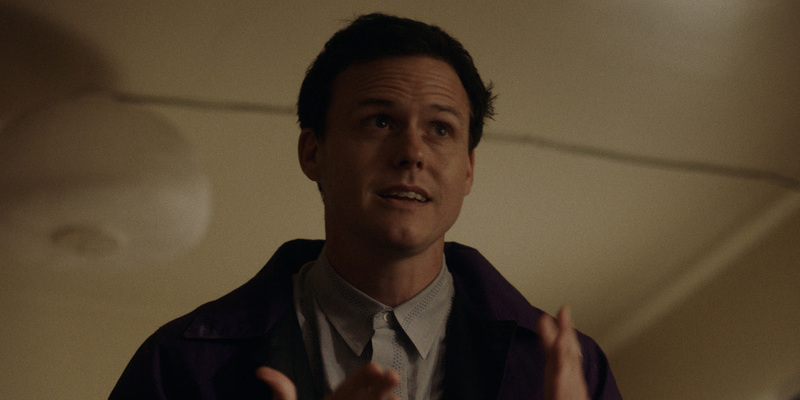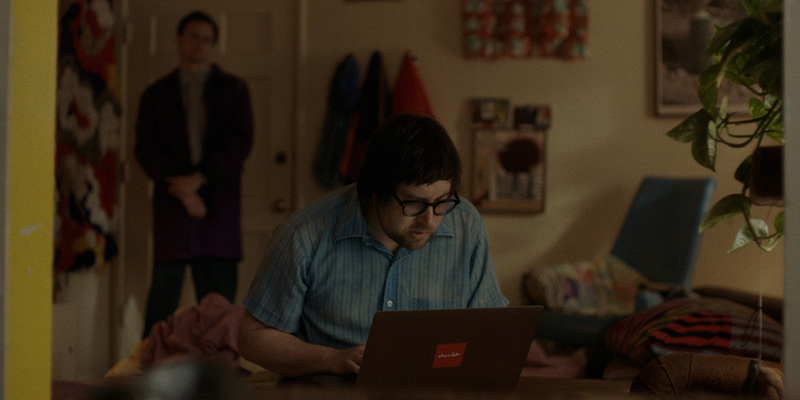
Review by
Eric Hillis
Directed by: Clay Tatum
Starring: Clay Tatum, Whitmer Thomas, Whitney Weir, Robert Longstreet, Megan Galley

An unrequited platonic friendship hurts a lot more than an unrequited
romance. A proclamation of "Sorry, you're not my type" can either be
dismissed as a case of bad taste or taken as a prompt to join a gym, get a
better haircut, change your wardrobe. But when someone tells you they
don't want to be your friend? Ooft. That's a damning assessment of your
character, and you can't fix your personality by pumping weights, shedding
carbs or wearing more vertical stripes. On the other hand, there are few
things worse than having to endure the company of someone you simply don't
want to be around.

And yet while there are lots of movies about failed romantic
relationships, very few filmmakers have delved into the horrors of
one-sided friendships. I can't say they do it particularly well, but with
their debut feature The Civil Dead, director Clay Tatum and his co-writer
Whitmer Thomas attempt to at least explore this largely untapped
dynamic.
Tatum plays Clay, a struggling photographer who finds himself left alone
for a week when his wife (Whitney Weir) leaves Los Angeles for a
work trip. He promises he'll make some effort to advance his career while
she's gone, but he really plans to spend the week drinking beer on his
couch. His modest ambitions are thwarted by the appearance of Whit
(Thomas), an old friend who has recently moved to LA.

The thing about Whit is that he's dead. Yes, he's a ghost, and after
wandering LA in limbo for weeks, he's finally found someone who can see
him. Clay is initially unhappy with this relatively benevolent haunting
but he realises having a ghost pal might have some benefits, like how Whit
helps him to cheat at a poker game. But Clay soon grows tired of this
spectral hanger-on and seeks a way to free himself from his pally
poltergeist.
Tatum and Whitmer cleverly subvert the well-worn tropes of ghost movies
by allowing us to see things from the spook's point of view. What might be
considered creepy bumps and creaks in the night are rendered harmless by
our knowledge that they're being caused by the affable Whit. At first we
feel sympathy for Whit, who seems like a genuinely decent bloke, unlike
the narcissistic Clay. Yet as the film progresses we begin to empathise
with Clay's plight. Haven't we all known someone who was objectively a
lovely person, but whose presence we found irritating? Maybe it's because
such unblemished folk make us feel like bad people by comparison. Isn't it
easier sometimes to be friends with an asshole, perhaps because you know
they won't be too hurt if you have to eventually tell them to fuck off?
Watching Clay's increasingly cruel treatment of Whit might make you think
about how you've treated people in your own life, people whose only crime
was failing to meet some arbitrary standards you've set.

For all its melancholy insight, The Civil Dead is never as
blackly comic as it believes itself to be. There are several setups that
have great potential for Larry David-esque comedy, like Clay's scamming of
would-be renters by charging a $50 application fee to view the home he's
renting himself, or that poker sequence, but they fall flat. It's a movie
filled with jokes waiting for a punchline, a comedy that is itself in
limbo, one that puts the dead in deadpan. For a successful version of this
dynamic, see the relationship between David Naughton and his undead buddy
Griffin Dunne in John Landis's unrivalled horror comedy masterpiece
An American Werewolf in London. "Have you ever talked to a corpse? It's boring!" Based on
The Civil Dead, Dunne might have been onto something with that statement.


